Boy Scouts of America sex abuse survivors claim censorship, object to bankruptcy exit plans
More than a year into the Boy Scouts of America’s bankruptcy proceedings, frustration is at a boiling point for sex abuse survivors who say the nonprofit organization is doing little to put forth meaningful reparations for their trauma.
Their anger has extended to the bankruptcy court itself, which is redacting hundreds of letters sent to Judge Laurie Silverstein, preventing the public from understanding the full extent of the abuse they say they suffered as children.
On Monday, the Torts Claimants Committee, the official body chosen to represent abuse survivors in the case, filed an objection to the Scouts’ latest bankruptcy reorganization plan, saying it "minimizes the organization’s history of failing to protect children from sexual predators."
The scathing objection says this strategy has been on display since day one, when an attorney for the organization failed to mention the abuse for the first 15 minutes of her opening presentation to the court, "well after her recitation of the Boy Scout Oath and Law."
Composed of nine men who say they were abused as children at the hands of Scout leaders, the committee said it has concluded over hours of meetings that "the Boy Scouts is either tone deaf or purposely minimizing the childhood sexual abuse claims that led to this Chapter 11 case."
Central to the objection is what the committee calls a small sum that the Boy Scouts has offered to put toward a trust for survivors as well as a lack of "the most basic information necessary" for survivors to ensure they are getting a fair deal. That includes financial details of local Scout councils and sponsoring organizations, some of which attorneys maintain are as liable as the national organization for the abuse.
The two camps differ wildly on estimated costs of the abuse. The Boy Scouts said in its latest plan that its claims expert estimates the cost of settling the claims at between $2.4 billion and $7.1 billion. The claimants' committee says it will be more than $100 billion.
Nearly 95,000 abuse claims were filed by the November deadline, though that number is expected to drop by about 10% after duplicates are removed.
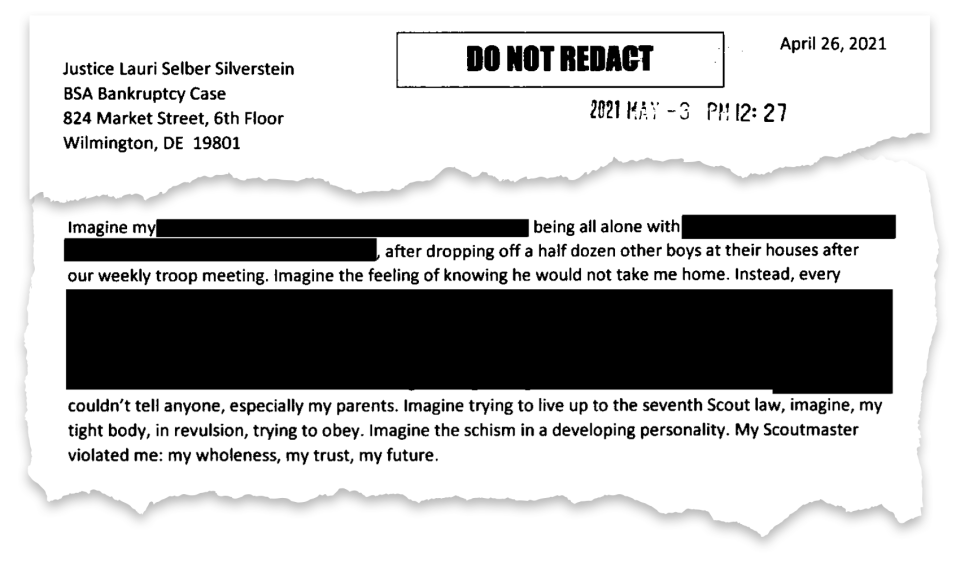
One lingering issue is how the remaining claims will be reviewed to determine such things as which are valid. Boy Scouts of America proposes to address that after a plan is accepted. Groups representing survivors have filed a motion to allow claims to be tested and their values determined before they agree to a reorganization plan.
The Boy Scouts has said it is fully committed to providing equitable compensation to survivors.
"The Boy Scouts of America filed for Chapter 11 bankruptcy to achieve two key imperatives: equitably compensate survivors who were harmed during their time in Scouting and continue to carry out Scouting’s mission for years to come," the organization said in a recent statement.
Boy Scouts files Chapter 11 bankruptcy in the face of thousands of child abuse allegations
Boy Scouts of America plan to exit bankruptcy would pay abuse survivors an average of $6,000 each
The growing tensions and costs of the largest sexual abuse bankruptcy case in history have spilled over to some of the country’s largest insurance companies, threatening the solvency of one and potentially ensnaring thousands of troop-sponsoring organizations, including the Mormon and Methodist churches.

The cost of the case itself is another growing point of contention. On Wednesday, Century Indemnity, one of the insurance companies that has policies issued to Boy Scouts of America, filed a motion asking the judge to hold 20% of monthly fees being billed by attorneys and other professionals until the end of the case, to stem the hemorrhaging of money from the Boy Scout estate.
Century argued that “a staggering number of professionals” are billing $1,000 to $1,500 an hour. And when accounting for the cut survivors’ attorneys will take from potential settlements, Century said more than half of the money made available through the bankruptcy could end up going to attorneys.
Attorneys for the Boy Scouts said in a March hearing that the case already had cost $100 million – about $10 million a month. They’ve repeatedly stated that to survive, they need to complete the bankruptcy by the end of summer.
Abuse survivors angered by redactions to their stories
Survivors have grown increasingly incensed at the focus on the Scouts' ability to remain financially solvent. Hundreds have written to Silverstein illustrating the impact the abuse they suffered has had on their lives: suicide attempts, drug and alcohol abuse, difficulties holding down jobs, trouble maintaining relationships, distrust of authority, years spent in therapy and more.
Many said they hoped that sharing their stories would not only illustrate what's at stake but mute the shame of child sexual abuse, particularly for boys.
Yet, acting at the judge's request, the clerk of court’s office has been censoring significant chunks of the letters, including blacking out graphic details of abuse in addition to names and locations.
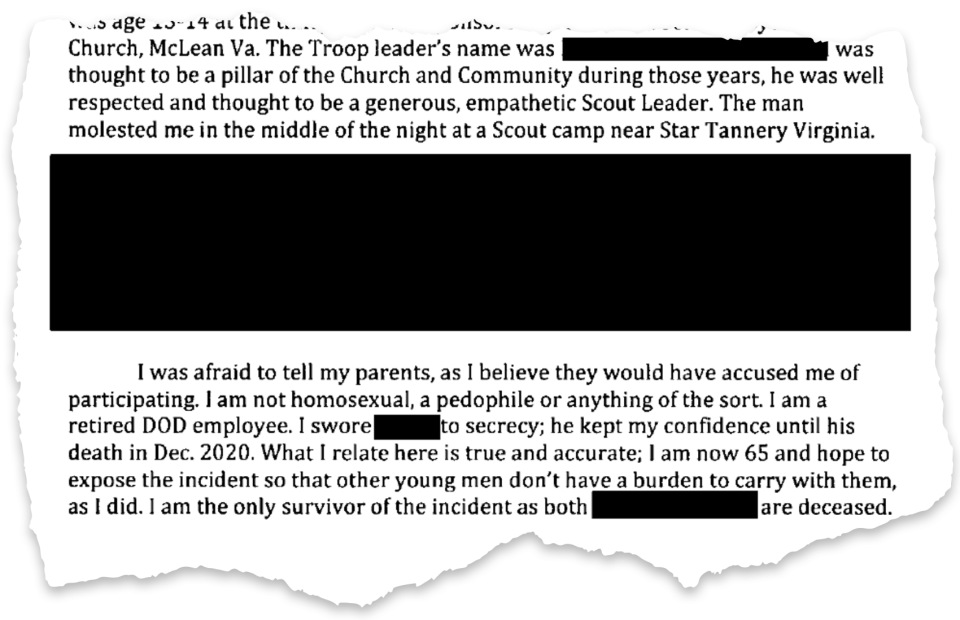
Clerk Una O'Boyle said the court routinely omits personal and graphic details from filings, pointing to an order signed early in the case by Silverstein stipulating that personal details of survivors would be redacted. Silverstein is receiving and reading the letters, O'Boyle said, and parties in the case also have access to the unredacted files.
“It’s retraumatizing,” said Tom Krumins, who filed a claim in the case and sent the judge a letter in which he describes being raped by an older Scout at camp. When the letter was uploaded to the court docket, a paragraph had been blacked out – including the word "rape."
“This is something that’s in my head every day of my life. It is graphic and terrifying and I have panic attacks most days,” Krumins said. “This same message gets shared with the judge who then doesn't share the information publicly, that defeats the entire purpose. I want my story to be heard.”
Tim Kosnoff, a lead attorney of the group Abused in Scouting who has tried thousands of child abuse cases, said it is further silencing survivors who are barred from suing by the bankruptcy.
“These are men who have been denied their right to tell their story because of the bankruptcy filing of the Boy Scouts,” Kosnoff said. “The automatic stay on litigation prevented them from saying, ‘This is who I am and this is who abused me.’”
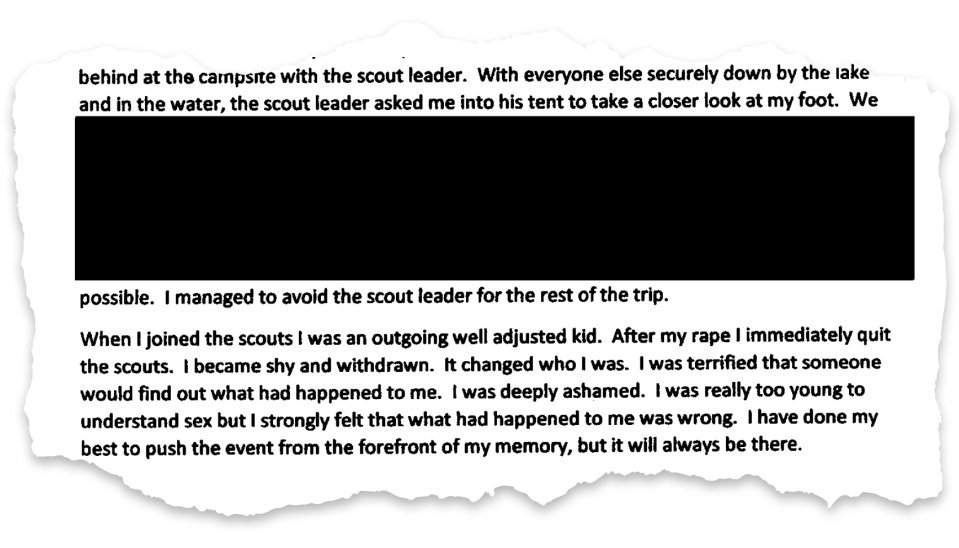
Survivors’ attorneys object to Boy Scouts’ plan
The objection filed by the Torts Claimants Committee details how difficult it will be for Boy Scouts to get the approval of survivors – a necessary step for the organization to reemerge from bankruptcy as a viable entity.
"That's what this illustrates, in careful detail, why this is going to be a steep uphill climb for Boy Scouts unless fundamental changes are made," said Paul Mones, an attorney who represents many survivors in the case.
Additionally, attorneys have filed separate briefs explaining their clients' objections, notably the absence of pertinent information about the finances of local councils and sponsoring organizations and how much they will contribute toward compensating survivors.
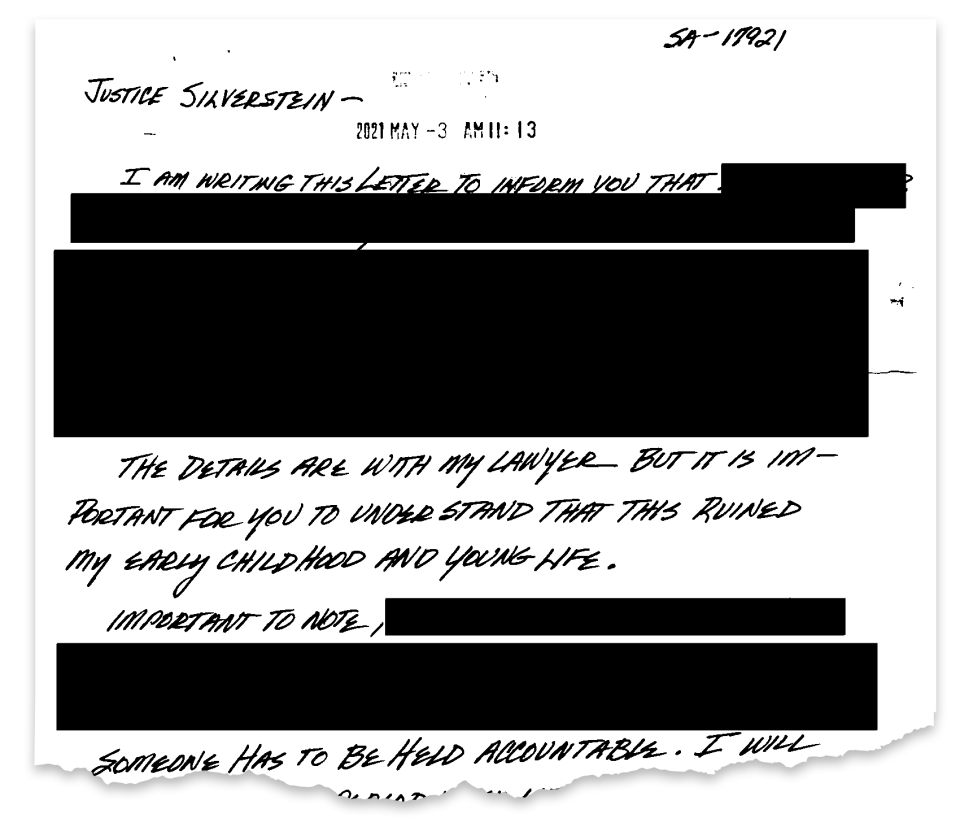
In a brief filed Thursday, Mones said his clients have strong cases against local councils, which he and other survivors’ attorneys have long said will need to make significant contributions to a trust for survivors to gain support for a reorganization plan.
In California, a claimant was abused by a Scout leader in 1987, more than a decade after Boy Scouts and the San Mateo Council learned of allegations that the leader was tying up and fondling Scouts. The leader was arrested on related charges but allowed to return to Scouting and abuse additional children, according to Mones’ brief.
Law firm Pfau Cochran Vertetis Amala PLLC (PCVA) also filed an objection on Friday detailing similar cases in which Scouts, councils and sponsoring organizations knew of confirmed or suspected abuse but failed to stop it.
The firm also said it has more than 80 clients with claims against the United Methodist Church, and 48 against the Church of Jesus Christ of Latter-day Saints. Thousands of organizations have sponsored local troops over the years, including schools, civic groups and religious organizations. Before it broke with Boy Scouts in 2018, the Mormon church was among the largest sponsoring groups.
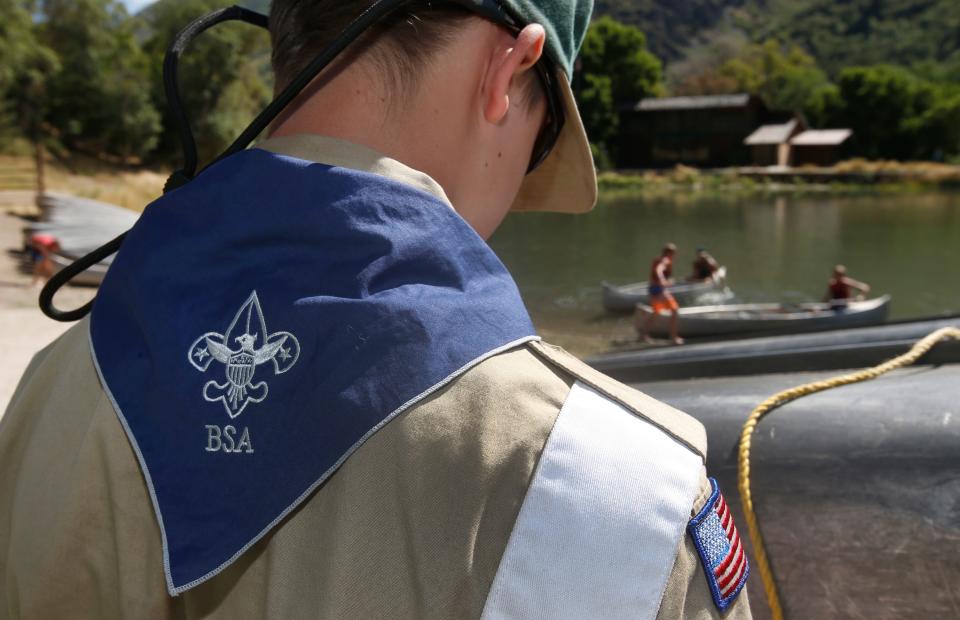
One Scout leader within the Mormon church was arrested in California in the 1970s for abusing a boy, according to the brief. A few years later he was arrested and convicted in Arizona of raping another boy. After the man was released from prison, the Mormon church allowed him to serve as a volunteer at one of its Cub Scout packs, where he allegedly abused a boy who is now a claimant in the bankruptcy case.
The Mormon church also filed an objection to the Boy Scouts’ plan, which was joined by the Methodist Church. In it, the Mormon church said that it had a long history with the Scouting organization, which it believed would take responsibility for any injuries or wrongdoing relating to Scouting activities.
Further, the church argued that it has a right to coverage by the Boy Scouts’ insurance. The Boy Scouts organization has valued the church's claims for coverage at zero in the bankruptcy.
Mounting costs threaten insurance companies
The scope of the case, and its mounting costs, are threatening the financial futures of Boy Scouts' insurers, too.
Many held dozens of policies over the years insuring the nonprofit for damages, including those arising from sexual abuse, which have long been expected to help fund a trust for survivors in addition to cash and other assets from the Boy Scouts.
A proposed settlement agreement between the Hartford and Boy Scouts reached last month, which ostensibly would contribute $650 million to abuse survivors, has spurred multiple objections.
One sticking point is a clause in the agreement that links the settlement with another of the Boy Scouts' insurers, Century Indemnity, saying that if the Scouts don't reach a settlement with Century for at least $1.3 billion, the Hartford agreement would be reduced by half of the difference between $1.3 billion and the amount paid by Century.
The Hartford paperwork suggests a larger potential problem: Century may have only $561 million in available assets.
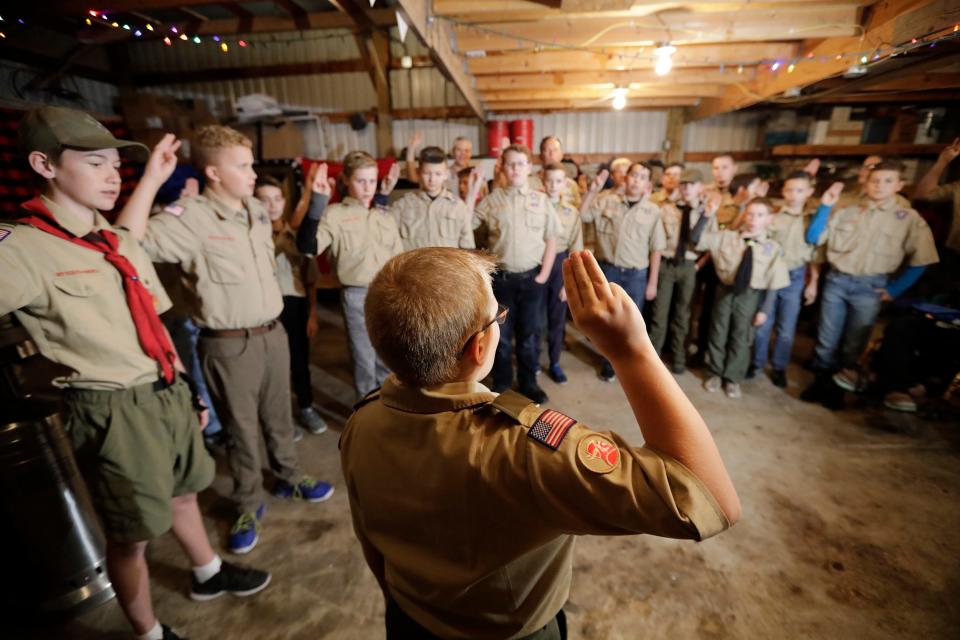
“This is not too uncommon. It can happen especially when dealing with these long tail claims,” said Daniel Schwarcz, a professor at the University of Minnesota Law School. “By the time they look for coverage, one of the insurers are in runoff or potentially insolvent so you’re only getting pennies from them.”
Lloyds of London, the once preeminent insurance company, nearly collapsed in the 1990s due in large part to asbestos claims.
Century is what’s known as a runoff, meaning it manages existing policies but doesn’t issue new ones. It was acquired by Chubb, the country's largest insurance company, in 2016. What Chubb’s responsibilities are, and why Century was tied to the Hartford agreement, is a confusing twist in the case that’s further incensed survivors’ attorneys.
The outcome will depend in part on how many claims must ultimately be paid. Century, Hartford and other insurers have pushed for more discovery in the case to determine the validity of claims, citing the high numbers of victims added by law firms right before the November bankruptcy filing deadline.
In objections filed with the court, insurers said advertising campaigns "resulted in an astonishing, 55-fold increase in pending claims against the Boy Scouts," noting that the Scouts initially said it faced 275 current cases and anticipated another 1,400.
The Torts Claimants Committee said in its objection that questioning the validity of claims is merely another effort to protect Boy Scouts and their insurers financially.
"The Boy Scouts, Local Councils, Chartered Organizations, and their respective insurance carriers self-servingly speculate regarding unproven fraud (to justify the incredibly low values they propose to pay to Survivors)," the committee wrote, "rather than recognizing that a fulsome notice program and real statute of limitations reform is finally forcing them to account for the sordid history of Boy Scouts sexual abuse."
Cara Kelly is a reporter on the USA TODAY investigations team, focusing primarily on pop culture, consumer news and sexual violence. Contact her at carakelly@usatoday.com, @carareports or CaraKelly on WhatsApp.
This article originally appeared on USA TODAY: Boy Scouts of America bankruptcy exit plan angers survivors of abuse

